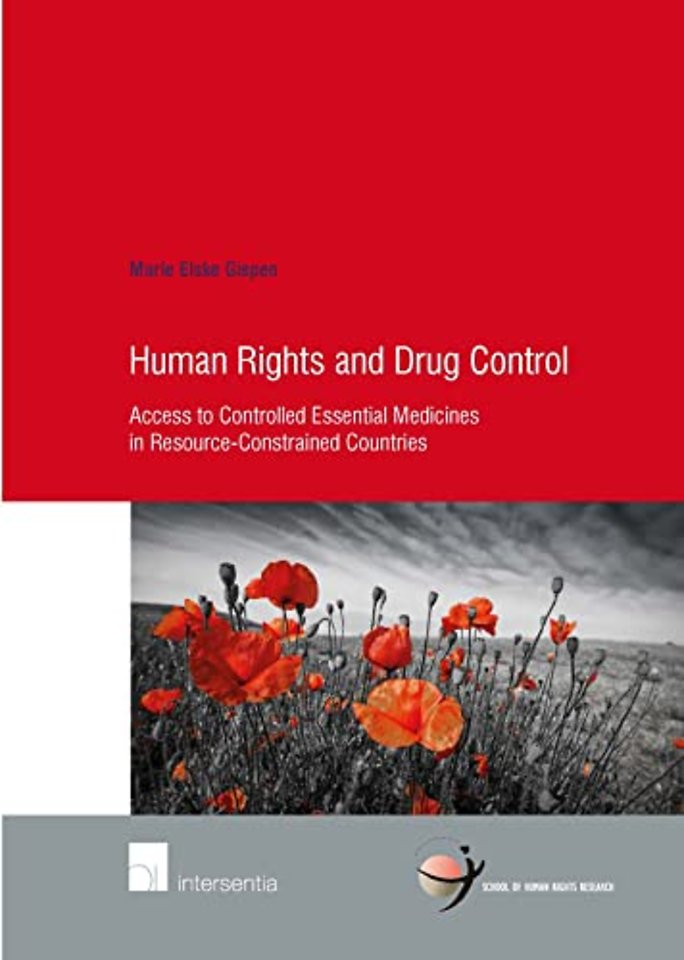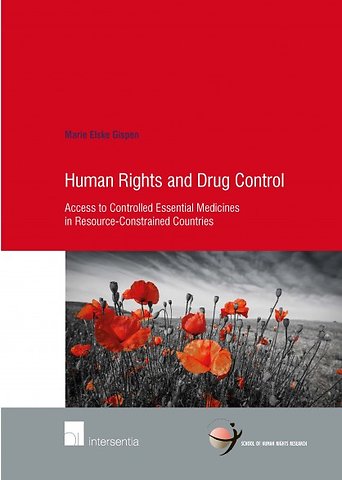


Marie Elske Gispen is Fellow of Health Law in a Global Context, Global Health Law Groningen Research Centre, Department of Transboundary Legal Studies, Faculty of Law, University of Groningen, the Netherlands.
Meer over Marie Elske GispenHuman Rights and Drug Control
Access to Controlled Essential Medicines in Resource-Constrained Countries
Samenvatting
Globally, millions of people suffer health and socio-economic related problems due to the unavailability of controlled essential medicines such as morphine for pain treatment, which leaves them in disabling and sometimes degrading situations. Controlled essential medicines are medicines included in the World Health Organization’s List of Essential Medicines, and whose active substance is listed under the international drug-control treaties. Their availability and accessibility therefore fall within the remit of both human rights and international drug-control law. Even though the unavailability of controlled essential medicines is generally caused by a multifaceted and complex interplay of factors, the current international drug-control framework paradoxically hinders rather than fosters the access to medicines.
Human Rights and Drug Control analyses a human rights interpretation of the international drug-control framework with an emphasis on advancing the access to controlled essential medicines in resource-constrained countries. Its approach goes beyond the more conventional legal analysis and includes an ethical analysis as well as two case studies in Uganda and Latvia. It first aims to identify a human rights foundation of drug control by examining how human rights norms would balance the underlying tension: some controlled substances have a clear, evidence-based medical benefit, yet also have the potential to be misused, which may lead to dependency disorders. This makes it evident that States should regulate this delicate equilibrium, the challenge being how they can do so legitimately in light of human rights norms.
Having explored this premise in the context of human rights law and theory, this book then applies these findings to Uganda and Latvia, – two ‘best practice’ countries – when it comes to improving the accessibility of morphine for pain treatment. Relying on qualitative research methods, the study explores whether the human rights basis of drug-control regulation may be adequately integrated into the structures of the present international drug-control system. It specifically deals with various technical, administrative and procedural obligations relating to the import/export and retail trade of controlled medicines. The book concludes with a proposal on how a human rights approach to drug-control may be advanced, specifically highlighting the importance of reconciling international obligations with the local reality in which these obligations come into play.
Specificaties
Inhoudsopgave
Chapter 1. Introduction (p. 1)
Chapter 2. Access to Controlled Essential Medicines: Context, Background, Framing, and Focus (p. 27)
Part 2. Normative Framework
Chapter 3. Access to Controlled Essential Medicines and Aspects of Drug Control in Human Rights Law (p. 77)
Chapter 4. In Search of a Normative Justification (p. 137)
Part 3. Country Studies
Chapter 5. Bridging Theory and Practice: Introduction to the Country Studies (p. 189)
Chapter 6. Country Study I: Uganda (p. 203)
Chapter 7. Country Study II: Latvia (p. 247)
Part 4. Conclusions and Recommendations
Chapter 8. Conclusions and Recommendations (p. 291)
Appendices (p. 313)
Samenvatting (Dutch summary) (p. 321)
Selected Bibliography (p. 331)
Index (p. 347)
Anderen die dit boek kochten, kochten ook
Net verschenen
Rubrieken
- aanbestedingsrecht
- aansprakelijkheids- en verzekeringsrecht
- accountancy
- algemeen juridisch
- arbeidsrecht
- bank- en effectenrecht
- bestuursrecht
- bouwrecht
- burgerlijk recht en procesrecht
- europees-internationaal recht
- fiscaal recht
- gezondheidsrecht
- insolventierecht
- intellectuele eigendom en ict-recht
- management
- mens en maatschappij
- milieu- en omgevingsrecht
- notarieel recht
- ondernemingsrecht
- pensioenrecht
- personen- en familierecht
- sociale zekerheidsrecht
- staatsrecht
- strafrecht en criminologie
- vastgoed- en huurrecht
- vreemdelingenrecht





